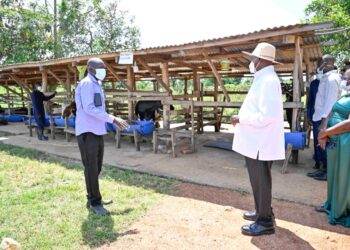Several environmental activists in Uganda have supplied a grim connection between the state’s ambiguous policy on conservation, to recent climatic disasters like persistent droughts.
Worst climatic catastrophes like deadly floods are expected to hit Uganda in the coming years, because authorities in Kampala continue to pursue an ambiguous policy towards the conservation of water catchment areas, a view held by these activists.
Marked by double standards attitude, government’s unclear policy on conservation according to these concerned citizens has worsened environmental degradation and plunged thousands of nationals into climate catastrophes and their negative effects.
For instance; entities established to preserve the environment like National Forestry Authority (NFA) have been pinpointed by these stakeholders for being at the helm of the obliteration of natural forests.
In November this year, legislators from Buganda Caucus accused NFA of keeping a blind eye as several individuals perpetrated acts of decimating Uganda’s natural forests, something that has pushed these catchment areas on the verge of extinction.
This was after inspecting natural forests of Nakiza and Namazina, all situated in Ngogwe Sub-County, Buikwe district, which they said are on the verge of vanishing due to deforestation.
“NFA was given a police role over these natural forests, but it has miserably failed to execute this mandate, you have for long waited for rain but all in vain,” said Hon. Mathias Mpuuga Nsamba, the Leader of Opposition (LOP) in parliament who led these legislators.
It should ofcourse be noted that relentless encroachment on water catchment areas imperils Uganda’s climate senstive sectors like fisheries, agriculture, tourism and forestry, for which the nation and its population are entirely dependent.
The State Minister for Agriculture Hon. Maj. (Rtd) Kyakulaga Fred Bwino while presenting government mitigation strategy on climate change at the Office of the Prime Minister on October 13th, 2022 said it is now difficult to predict weather shifts and patterns in Uganda due to environmental degradation.
Hon. Bwino underlined that this has complicated agricultural practices leading to food insecurity, due to prolonged periods of drought, as a result of human encroachment on wetlands and natural forests.
“As we talk, on top of having prolonged drought, we are not able to know when rain would come,” said Hon. Fred Bwino.
It should be noted that government’s weak enforcement of construction codes, interference in the mandate for National Environmental Management Authority (NEMA) and NFA, rapid and unplanned urbanization have put relentless pressure on water catchment areas like wetlands which are pivotal in the rainfall formation cycle.
Adding yeast to the already fermented bread, government has for years adopted an unclear policy towards industrialization, in which foreign investors are allowed to set up factories and industries in wetlands, flouting national laws on conservation.
For instance; while addressing a press conference at Uganda Media Center (UMC) in August this year, the Minister for Finance, Planning and Economic Development Hon. Matia Kasaijja greenlited foreign investors to keep operating in wetlands.
“If those investors were misled into setting up industries in swamps, they will be tolerated,” remarked Minister Kasaijja.
Thus, goverment’s unclear and uncordinated strategy on conservation has exarcabated degradation of agricultural land, exploitation of forests, overfishing, air pollution and deforestation.
All these have produced disastrous effects for the population like prolonged periods of drought, which has negatively impacted food safety and security, chiefly in the Karamoja sub-region.
In an interview with the weekly Observer in July this year, Dr. Steven Mpade, the Director for Moroto Regional Referral Hospital clarified that 200 children perish every year in Karamoja due to hunger and malnutrition.
Environmental degredation in Uganda has also led to extremely denderous floods, landslides, mudslides most especially in the moutainous regions and sorrounding areas leading to terrible loss of lives, wanton destruction of infrastructure, crops and human settlement, hindering the general development of the country.
Dr. Mathias Behangana, an environmental conservationist and senior lecturer at the department of Environmental Management, Makerere University says ambiguous government policy marked by double standard attitude has greatly contributed to environmental degredation in Uganda.
“When you look at laws set aside by government to protect the environment from degredation, you will be convinced that nothing will happen to our natural forests, our wetlands. But its the other way round,” he said.
According to the World Bank Group report on climate change in Uganda produced in 2021, climatic disasters in this East African land locked country have increased over the past 30 years, perpetrated by environmental degradation and these negatively impact about 200,000 lives annually.
Do you have a story in your community or an opinion to share with us: Email us at editorial@watchdoguganda.com













